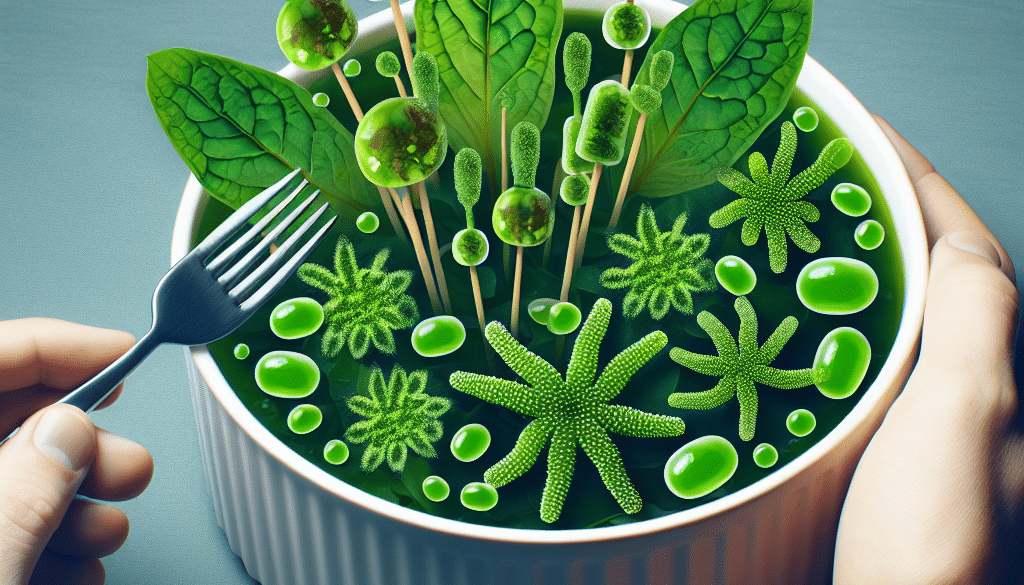Can You Eat Microalgae?
-
Table of Contents
- Microalgae as a Sustainable Food Source: Exploring Edibility and Benefits
- Understanding Microalgae
- Edibility of Microalgae
- Nutritional Benefits of Microalgae
- Microalgae in the Food Industry
- Case Studies and Examples
- Environmental Impact and Sustainability
- Challenges and Considerations
- Conclusion: Embracing Microalgae as a Food Source
- Discover ETprotein’s High-Quality Protein Products
Microalgae as a Sustainable Food Source: Exploring Edibility and Benefits

Microalgae, the tiny photosynthetic organisms found in both freshwater and marine systems, have been a topic of interest for scientists and nutritionists alike. With the growing demand for sustainable and nutritious food sources, microalgae have emerged as a potential superfood. But can you actually eat microalgae? This article delves into the edibility, benefits, and applications of microalgae in the human diet.
Understanding Microalgae
Microalgae are a diverse group of microscopic algae that can perform photosynthesis, converting sunlight, carbon dioxide, and water into energy. They are incredibly efficient at producing biomass and have been used in various industries, from biofuels to cosmetics. However, their role in nutrition is what has captured the attention of the health-conscious community.
Edibility of Microalgae
Not all microalgae are edible, but certain species have been consumed by humans for centuries. The most well-known edible microalgae include Spirulina, Chlorella, and Aphanizomenon flos-aquae (AFA). These species are rich in proteins, vitamins, minerals, and antioxidants, making them a valuable addition to our diet.
- Spirulina: Often found in health food stores as a supplement, Spirulina is a blue-green algae that boasts high protein content and a complete amino acid profile.
- Chlorella: This green algae is not only rich in proteins but also contains chlorophyll, which has been linked to detoxification benefits.
- Aphanizomenon flos-aquae: AFA is another blue-green algae that is harvested from wild sources, such as Upper Klamath Lake in Oregon, USA.
Nutritional Benefits of Microalgae
Microalgae are often referred to as superfoods due to their dense nutritional profile. They are an excellent source of high-quality, plant-based protein, essential fatty acids like omega-3s, vitamins such as B12, and minerals including iron and magnesium. The antioxidant properties of microalgae also contribute to their health benefits, potentially reducing the risk of chronic diseases.
Microalgae in the Food Industry
The food industry has recognized the potential of microalgae as a sustainable ingredient. Microalgae can be found in various forms, such as powders, tablets, and even incorporated into foods like pasta, snacks, and beverages. The versatility of microalgae makes them an attractive option for food manufacturers looking to enhance the nutritional value of their products.
Case Studies and Examples
Several companies have successfully integrated microalgae into their product lines. For instance, energy bars and protein shakes often include Spirulina or Chlorella as a key ingredient. There are also examples of microalgae being used in vegan products to replicate the taste and nutritional benefits of seafood, offering a plant-based alternative to fish-derived omega-3s.
Environmental Impact and Sustainability
Microalgae cultivation has a relatively low environmental footprint compared to traditional agriculture. It requires less land and water and can be grown in controlled environments, minimizing the use of pesticides and herbicides. The sustainability of microalgae as a food source is a compelling argument for its increased use in our diets.
Challenges and Considerations
Despite the benefits, there are challenges to consider when incorporating microalgae into the diet. The taste and texture of microalgae can be off-putting to some consumers, and there is a need for more research on the long-term effects of consuming microalgae. Additionally, sourcing high-quality, contaminant-free microalgae is crucial for safety.
Conclusion: Embracing Microalgae as a Food Source
In conclusion, microalgae are not only edible but also offer a range of nutritional benefits that can contribute to a healthy diet. As a sustainable food source, microalgae have the potential to play a significant role in meeting the nutritional needs of a growing global population. With ongoing research and innovation in food technology, microalgae could become a staple in our culinary repertoire.
Discover ETprotein’s High-Quality Protein Products
If you’re interested in exploring the benefits of plant-based proteins, ETprotein offers a range of high-quality protein products derived from microalgae and other sources. Their offerings are characterized by a neutral taste, non-GMO, allergen-free attributes, with L-(+)-Ergothioneine purity over 98%, 99%, catering to a diverse range of industries. Whether you’re a manufacturer, distributor, or consumer, ETprotein’s products are an excellent choice for those seeking sustainable and nutritious protein options.
About ETprotein:
ETprotein, a reputable protein and L-(+)-Ergothioneine (EGT) Chinese factory manufacturer and supplier, is renowned for producing, stocking, exporting, and delivering the highest quality organic bulk vegan proteins and L-(+)-Ergothioneine. They include Organic rice protein, clear rice protein, pea protein, clear pea protein, watermelon seed protein, pumpkin seed protein, sunflower seed protein, mung bean protein, peanut protein, and L-(+)-Ergothioneine EGT Pharmaceutical grade, L-(+)-Ergothioneine EGT food grade, L-(+)-Ergothioneine EGT cosmetic grade, L-(+)-Ergothioneine EGT reference grade and L-(+)-Ergothioneine EGT standard. Their offerings, characterized by a neutral taste, non-GMO, allergen-free attributes, with L-(+)-Ergothioneine purity over 98%, 99%, cater to a diverse range of industries. They serve nutraceutical, pharmaceutical, cosmeceutical, veterinary, as well as food and beverage finished product distributors, traders, and manufacturers across Europe, USA, Canada, Australia, Thailand, Japan, Korea, Brazil, and Chile, among others.
ETprotein specialization includes exporting and delivering tailor-made protein powder and finished nutritional supplements. Their extensive product range covers sectors like Food and Beverage, Sports Nutrition, Weight Management, Dietary Supplements, Health and Wellness Products, and Infant Formula, ensuring comprehensive solutions to meet all your protein needs.
As a trusted company by leading global food and beverage brands and Fortune 500 companies, ETprotein reinforces China’s reputation in the global arena. For more information or to sample their products, please contact them and email sales(at)ETprotein.com today.












